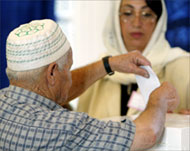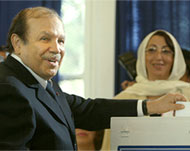Algerians vote on peace plan
Algerians have voted on a peace plan the government says will help the country move on from a brutal Islamic insurgency that has left an estimated 150,000 dead, but which critics charge will whitewash past crimes.

More than 18 million voters were called to polling stations on Thursday in the oil- and gas-rich North African country, which stretches from the Mediterranean coast to the sandy wastes of the Sahara Desert and is a US ally in the war on terror.
Preliminary results from the referendum were expected around midnight (2300GMT) on Thursday, after 12 hours of voting. Polls opened at 8 am (0700GMT).
Voters were asked simply whether they approved of the proposed Charter for Peace and National Reconciliation.
They received two ballots, one white marked “No” in Arabic and French – a linguistic legacy of France‘s former rule of Algeria – the other blue, marked “Yes”.
Voters slipped their choice into an envelope that they then dropped into ballot boxes.
Opportunity
President Abdelaziz Bouteflika sold the charter as an opportunity to close the wounds from the deadly violence and atrocities that gripped Algeria for more than a decade, after the insurgency erupted in 1992.
 |
|
Critics say the vote is an attempt |
Bouteflika needed a high participation rate to give his project legitimacy. He crisscrossed Algeria for weeks before the referendum, stumping for a “yes” of reconciliation and asking victims of the bloodshed and their families for a “new sacrifice in the interest of the nation”.
Bouteflika said the violence had caused $35 billion of damage and left some 150,000 dead – raising the estimated death toll which had long hovered around 120,000.
Foreign diplomats in Algeria said there was no way to know a precise figure.
After six hours of voting, 44% of electors had cast ballots, the interior ministry said. Observers said they expected the highest turnout to be in the evening.
Accusation
Critics, including human rights groups and some political parties, accused the president of seeking to whitewash the years of horror and the cases of thousands of people who disappeared.
They dismissed the charter as a way for the president to further consolidate power in his nation of nearly 33 million, and said that, with pardons for many of those who perpetrated the violence, it goes against the very notion of peace.
 |
|
Bouteflika says insurgency has |
The insurgency started when the army cancelled the January 1992 second round of voting in Algeria’s first multiparty legislative elections to thwart a likely victory by the
now-banned Islamic Salvation Front.
Daily beheadings and massacres committed by Islamic extremists followed. Tens of thousands of civilians were killed.
There were strong accusations that government security forces had at least a passive role in some of the bloodshed.
Victims’ families contend that security forces were responsible for many of the thousands of disappearances.
Although the insurgents have been largely tamed, sporadic violence continues. The government says 800-1000 insurgents remain active.